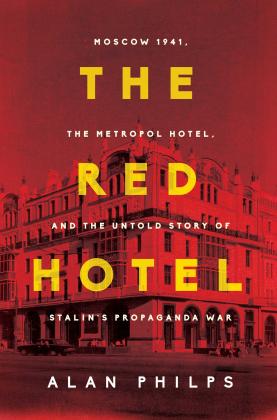
| Format | Hardcover |
| Publication Date | 07/04/23 |
| ISBN | 9781639364275 |
| Trim Size / Pages | 6 x 9 in / 464 |
The untold history of Moscow's Metropol hotel—a fervent spot of intrigue, secrets, and the center of Stalin's nefarious propaganda during WWII.
*A Washington Post Best Book of the Year*
In 1941, when German armies were marching towards Moscow, Lenin’s body was moved from his tomb on Red Square and taken to Siberia. By 1945, a victorious Stalin had turned a poor country into a victorious superpower. Over the course of those four years, Stalin, at Churchill's insistence, accepted an Anglo-American press corps in Moscow to cover the Eastern Front. To turn these reporters into Kremlin mouthpieces, Stalin imposed the most draconian controls – unbending censorship, no visits to the battle front, and a ban on contact with ordinary citizens.
The Red Hotel explores this gilded cage of the Metropol Hotel. They enjoyed lavish supplies of caviar and had their choice of young women to employ as translators and share their beds. On the surface, this regime served Stalin well: his plans to control Eastern Europe as a Sovietised ‘outer empire’ were never reported and the most outrageous Soviet lies went unchallenged.
But beneath the surface the Metropol was roiling with intrigue. While some of the translators turned journalists into robotic conveyors of Kremlin propaganda, others were secret dissidents who whispered to reporters the reality of Soviet life and were punished with sentences in the Gulag. Using British archives and Soviet sources, the unique role of the women of the Metropol, both as consummate propagandists and secret dissenters, is told for the first time.
At the end of the war when Lenin returned to Red Square, the reporters went home, but the memory of Stalin’s ruthless control of the wartime narrative lived on in the Kremlin. From the weaponization of disinformation to the falsification of history, from the moving of borders to the neutralisation of independent states, the story of the Metropol mirrors the struggles of our own modern era.
Buy it now in print:
Buy it now in ebook:
"In this tale of intrigue and suppression, Philps, a journalist, investigates what happened when Stalin decided to allow the Anglo-American Press Corps into the U.S.S.R. — on his terms, of course — between 1941 and 1945. Correspondents were installed at the once-luxurious Metropol Hotel, where they were feted, monitored and fed a steady diet of Kremlin propaganda." The New York Times Book Review
“In The Red Hotel, Mr. Philps conveys Nadya Ulanovskaya’s story in stirring detail, both her improbable adventures before World War II and the ordeals she experienced in the Gulag. Stalin’s tight control of what could be reported—whether from the Metropol or elsewhere—didn’t fool everyone.” The Wall Street Journal
“Philps’s book vindicates the value of truth, most of all by depicting the lengths that a rare few will go to share it. Yet Philps is also clear-eyed enough to show that truth will not always come out — at least, not easily, and not without cost.” The Washington Post
“An unsettling account of how a cadre of foreign correspondents in Moscow during World War II were pressed to acquiesce to the Kremlin’s censorship. Philps’s thoughtful narrative puts their work into the appropriate historical context. An authoritative history of the terrible ramifications of the silence about Stalin’s lies.” Kirkus Reviews
"The Red Hotel is a compelling and often horrifying tale of moral degradation and occasional heroism superbly told by a seasoned reporter, Alan Philps, who knew Moscow first-hand in the last years of communism. The shiniest stars in Mr Philps’s book are the female fixers who were controlled by the secret police but managed against the odds to retain a modicum of their integrity." The Economist
"Alan Philps’s The Red Hotel shines a light on the men and women caught up in Stalin’s propaganda machine and their attempts to tell the truth in a foreign land during a pivotal stage of the war. Philps gives them equal billing and shows the lengths they went to and the risks they took to reveal what life was truly like in Stalin’s Russia." The Washington Examiner
"A riveting trip down the corridors of Soviet deception. Philps's book is almost faultlessly balanced between racy narrative and historical analysis." Sunday Telegraph
"In a fascinating and surprising narrative, Alan Philps reveals the untold story of the foreign press and its struggle to circumvent the brutal censorship in Stalin’s Russia to bring the true story of the brutality of life and war in the Soviet Union to the world. Through fine research and engaging writing, The Red Hotel unveils an untold tale of life on the Eastern front during one of the most titanic conflicts in human history." Laurence Jurdem, author of The Rough Rider and the Professor
"Ostensibly the story of the Allied reporters based during World War II in the Metropol Hotel in Moscow, the real heroes of the book are the female translators who at great personal risk sought to tell the truth about Stalin. A timely reminder of Russia’s ambitions and desire to shape the historical narrative.” Andrew Lownie, author of Stalin's Englishman: The Lives of Guy Burgess
"The Red Hotel is a vivid, intimate, and engaging account of foreign journalists confined to Moscow’s Metropole Hotel by Stalin during World War II—and their relations with young women translators sent by the Soviets to spy on and assist them. Philps’s fascinating narrative details the brutal suffering of innocent Russians in Stalin’s Gulag and evokes dark parallels between Stalin and Putin in their obsession with controlling the flow of information at home." Susan Wels, author of Assassin in Utopia